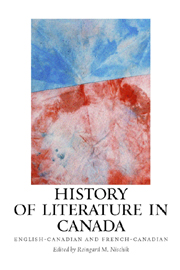Book contents
- Frontmatter
- Contents
- Acknowledgments
- Introduction: Writing a History of Literature in Canada
- I Beginnings
- II The Literature of New France, 1604–1760
- III The Literature of British Canada, 1763–1867
- IV From the Dominion to the Territorial Completion of the Nation, 1867–1918
- V The Modern Period, 1918–1967
- 11 Politics and Literature between Nationalism and Internationalism
- 12 English-Canadian Poetry, 1920–1960
- 13 The English-Canadian Novel and the Displacement of the Romance
- 14 The Modernist English-Canadian Short Story
- 15 Early English-Canadian Theater and Drama, 1918–1967
- 16 French Canada from the First World War to 1967: Historical Overview
- 17 French-Canadian Poetry up to the 1960s
- 18 The French-Canadian Novel between Tradition and Modernism
- 19 The French-Canadian Short Story
- 20 French-Canadian Drama from the 1930s to the Révolution tranquille
- VI Literature from 1967 to the Present
- Further Reading
- Notes on the Contributors
- Index
17 - French-Canadian Poetry up to the 1960s
from V - The Modern Period, 1918–1967
Published online by Cambridge University Press: 12 September 2012
- Frontmatter
- Contents
- Acknowledgments
- Introduction: Writing a History of Literature in Canada
- I Beginnings
- II The Literature of New France, 1604–1760
- III The Literature of British Canada, 1763–1867
- IV From the Dominion to the Territorial Completion of the Nation, 1867–1918
- V The Modern Period, 1918–1967
- 11 Politics and Literature between Nationalism and Internationalism
- 12 English-Canadian Poetry, 1920–1960
- 13 The English-Canadian Novel and the Displacement of the Romance
- 14 The Modernist English-Canadian Short Story
- 15 Early English-Canadian Theater and Drama, 1918–1967
- 16 French Canada from the First World War to 1967: Historical Overview
- 17 French-Canadian Poetry up to the 1960s
- 18 The French-Canadian Novel between Tradition and Modernism
- 19 The French-Canadian Short Story
- 20 French-Canadian Drama from the 1930s to the Révolution tranquille
- VI Literature from 1967 to the Present
- Further Reading
- Notes on the Contributors
- Index
Summary
Diversity of Voices
IN THE DOGGED STRUGGLE between progressive and conservative forces that, in varying intensity, took place in every genre in French-Canadian literature during the time between the end of the First World War and the 1960s, poetry proved to be the driving force of innovation. It managed to overcome the ideology and aesthetic perceptions of the past and, until the beginning of the 1960s, became French Canada's dominant genre. In the interplay of regionalism and exoticism, of nationalistic “homeland” discourse and an emerging national consciousness, of classical mimetic and surrealistically inspired poetry, of verse, vers libre, and the complete liberation from formal constrictions, almost everything was experimented with. It is difficult, however, to establish exact temporal borderlines, as many tendencies occurred simultaneously and oscillated between progressive and regressive. Individual poets of high renown unjustifiably overshadowed so-called minor poets, so that some of them were only discovered in the 1970s.
Regionalism versus Exoticism
In the years after the First World War the old debate between regionalists (terroiristes, Américanistes) and exoticists (Parisianistes) continued. While the former emphasized the self-sufficiency of Canadian literature, the latter saw themselves both in a francophone and in an international context. The manner in which the regionalists patriotically turned to the landscape and the local customs as well as to the North American wilderness stood in direct contrast to the poetics of the exoticists, for whom art was sufficient unto itself. They advocated individual artistic freedom and formal experimentation.
- Type
- Chapter
- Information
- History of Literature in CanadaEnglish-Canadian and French-Canadian, pp. 228 - 241Publisher: Boydell & BrewerPrint publication year: 2008

